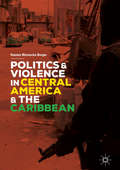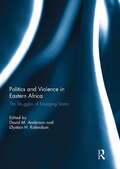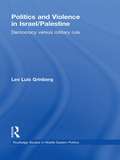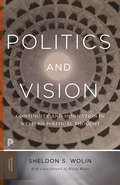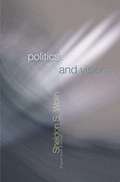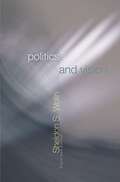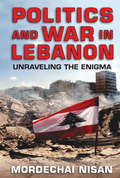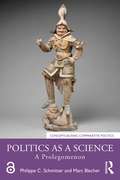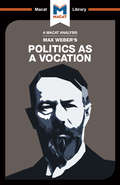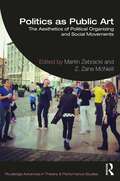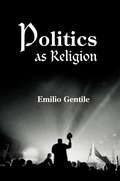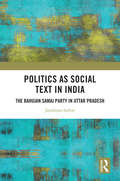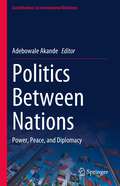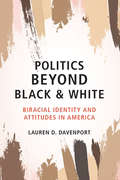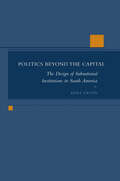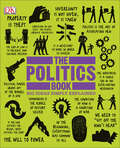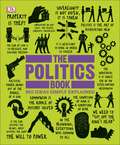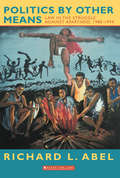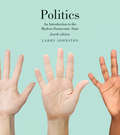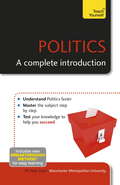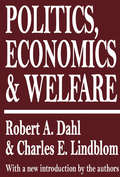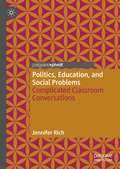- Table View
- List View
Politics and Tradition between Rome, Ravenna and Constantinople
by M. Shane BjornlieThe Variae of Cassiodorus have long been valued as an epistolary collection offering a window into political and cultural life in a so-called barbarian successor state in sixth-century Italy. However, this study is the first to treat them as more than an assemblage of individual case studies and to analyse the collection's wider historical context. M. Shane Bjornlie highlights the insights the Variae provide into early medieval political, ecclesiastical, fiscal and legal affairs and the influence of the political and military turbulence of Justinian's reconquest of Italy and of political and cultural exchanges between Italy and Constantinople. The book also explores how Cassiodorus revised, updated and assembled the Variae for publication and what this reveals about his motives for publishing an epistolary record and for his own political life at a crucial period of transformation for the Roman world.
Politics and Violence in Central America and the Caribbean
by Hannes Warnecke-BergerThis book develops a comparative study on violence in Jamaica, El Salvador, and Belize based on a theoretical approach, extensive field research, and in-depth empirical research. It combines the Caribbean and Central America into a single comparative research that explores the historical (from the conquista onwards) as well as contemporary causes of violence in these societies. The volume focuses on forms of violence such as gang violence, police violence, every day forms of violence, vigilantism, and organized crime. The analysis provides a theoretical perspective that bridges political economy as well as cultural approaches in violence research. As such, it will be of interest to readers studying development, violence, political, Central American, and Caribbean studies.
Politics and Violence in Eastern Africa: The Struggles of Emerging States
by David M. Anderson and Øystein H. RolandsenOver the fifty years between 1940 and 1990, the countries of eastern Africa were embroiled in a range of debilitating and destructive conflicts, starting with the wars of independence, but then incorporating rebellion, secession and local insurrection as the Cold War replaced colonialism. The articles gathered here illustrate how significant, widespread, and dramatic this violence was. In these years, violence was used as a principal instrument in the creation and consolidation of the authority of the state; and it was also regularly and readily utilised by those who wished to challenge state authority through insurrection and secession. Why was it that eastern Africa should have experienced such extensive and intensive violence in the fifty years before 1990? Was this resort to violence a consequence of imperial rule, the legacy of oppressive colonial domination under a coercive and non-representative state system? Did essential contingencies such as the Cold War provoke and promote the use of violence? Or, was it a choice made by Africans themselves and their leaders, a product of their own agency? This book focuses on these turbulent decades, exploring the principal conflicts in six key countries – Kenya, Uganda, Sudan, Ethiopia, Somalia and Tanzania. This book was published as a special issue of the Journal of Eastern African Studies.
Politics and Violence in Israel/Palestine: Democracy versus Military Rule (Routledge Studies in Middle Eastern Politics)
by Lev Luis GrinbergThe Israeli regime is a paradox. Considered a democracy, it has no recognized borders and controls the majority of Palestinians by military rule, while the resistance of non-citizen Palestinians exerts major influence over politics and policies. Drawing on detailed academic research and a broad knowledge of Israeli politics and the Israeli-Palestinian conflict, this book narrates and analyzes the political developments of the Israeli-Palestinian peace process and the conflict with Hezbollah and Hamas, explaining the dangers to future negotiations and how hopes for a settlement have been dashed by the ongoing violence. The author explores the internal Israel and Palestinian politics, showing how they influence the conflict and explaining the central role of military organizations in shaping the relations towards the other nation. With particular relevance to current events, he analyzes the Unilateral Disengagement from Gaza and the second Lebanon War, which account for the deterioration into the present violence and political crisis, explaining the need for international mediation in order to reach a peace agreement and suggesting a new innovative model for future Israeli-Palestinian relations.
Politics and Vision: Continuity and Innovation in Western Political Thought
by Wendy Brown Sheldon S. WolinPolitics and Vision is a landmark work by one of the great thinkers of the twentieth century. This is a significantly expanded edition of one of the greatest works of modern political theory. Sheldon Wolin's Politics and Vision inspired and instructed two generations of political theorists after its appearance in 1960. Substantially expanded for republication in 2004, it is both a sweeping survey of Western political thought and a powerful account of contemporary predicaments of power and democracy. In lucid and compelling prose, Sheldon Wolin offers original, subtle, and often surprising interpretations of political theorists from Plato to Rawls. Situating them historically while sounding their depths, he critically engages their diverse accounts of politics, theory, power, justice, citizenship, and institutions. The new chapters, which show how thinkers have grappled with the immense possibilities and dangers of modern power, are themselves a major theoretical statement. They culminate in Wolin's remarkable argument that the United States has invented a new political form, "inverted totalitarianism," in which economic rather than political power is dangerously dominant. In this expanded edition, the book that helped to define political theory in the late twentieth century should energize, enlighten, and provoke generations of scholars to come. Wolin originally wrote Politics and Vision to challenge the idea that political analysis should consist simply of the neutral observation of objective reality. He argues that political thinkers must also rely on creative vision. Wolin shows that great theorists have been driven to shape politics to some vision of the Good that lies outside the existing political order. As he tells it, the history of theory is thus, in part, the story of changing assumptions about the Good. Acclaimed as a tour de force when it was first published, and a major scholarly event when the expanded edition appeared, Politics and Vision will instruct, inspire, and provoke for generations to come.
Politics and Vision: Continuity and Innovation in Western Political Thought
by Sheldon S. WolinThis is a significantly expanded edition of one of the greatest works of modern political theory. Sheldon Wolin's Politics and Vision inspired and instructed two generations of political theorists after its appearance in 1960. This new edition retains intact the original ten chapters about political thinkers from Plato to Mill, and adds seven chapters about theorists from Marx and Nietzsche to Rawls and the postmodernists. The new chapters, which show how thinkers have grappled with the immense possibilities and dangers of modern power, are themselves a major theoretical statement. They culminate in Wolin's remarkable argument that the United States has invented a new political form, "inverted totalitarianism," in which economic rather than political power is dangerously dominant. In this new edition, the book that helped to define political theory in the late twentieth century should energize, enlighten, and provoke generations of scholars to come. Wolin originally wrote Politics and Vision to challenge the idea that political analysis should consist simply of the neutral observation of objective reality. He argues that political thinkers must also rely on creative vision. Wolin shows that great theorists have been driven to shape politics to some vision of the Good that lies outside the existing political order. As he tells it, the history of theory is thus, in part, the story of changing assumptions about the Good. In the new chapters, Wolin displays all the energy and flair, the command of detail and of grand historical developments, that he brought to this story forty years ago. This is a work of immense talent and intense thought, an intellectual achievement that will endure.
Politics and Vision
by Sheldon S. WolinThis is a significantly expanded edition of one of the greatest works of modern political theory. Sheldon Wolin's Politics and Vision inspired and instructed two generations of political theorists after its appearance in 1960. This new edition retains intact the original ten chapters about political thinkers from Plato to Mill, and adds seven chapters about theorists from Marx and Nietzsche to Rawls and the postmodernists. The new chapters, which show how thinkers have grappled with the immense possibilities and dangers of modern power, are themselves a major theoretical statement. They culminate in Wolin's remarkable argument that the United States has invented a new political form, "inverted totalitarianism," in which economic rather than political power is dangerously dominant. In this new edition, the book that helped to define political theory in the late twentieth century should energize, enlighten, and provoke generations of scholars to come. Wolin originally wrote Politics and Vision to challenge the idea that political analysis should consist simply of the neutral observation of objective reality. He argues that political thinkers must also rely on creative vision. Wolin shows that great theorists have been driven to shape politics to some vision of the Good that lies outside the existing political order. As he tells it, the history of theory is thus, in part, the story of changing assumptions about the Good. In the new chapters, Wolin displays all the energy and flair, the command of detail and of grand historical developments, that he brought to this story forty years ago. This is a work of immense talent and intense thought, an intellectual achievement that will endure.
Politics and War in Lebanon: Unraveling the Enigma
by Mordechai NisanLebanon is an exceptionally misunderstood country; its religious politics are typically misrepresented and denigrated in Western political commentary. Politics and War in Lebanon offers a lucid examination of Lebanese society and politics. Mordechai Nisan examines Lebanon in its own termson its own cultural turf. He then points to the causes of political disintegration in 1975 and explores the capacity of Lebanon to recover and retain its unique national poise.Avoiding disorienting Western stereotypes, Nisan presents Lebanon in its own native frame of reference, as a multi-ethnic country that operates according to its immutable and enigmatic political forms. Lebanon is different from other Arab countries, as demonstrated through its very complex electoral system, its tradition of cross-elite cooperation, and its special sense of Lebanese national identity that differentiates it from its overbearing Syrian neighbor.Nisan explores intra-Maronite Christian feuds, identifies Syria's occupation strategy, analyzes the violence of the Palestinians, and studies Israel's failed policy strategy and the role of Hezbollah in the Lebanese power equation. Lebanon is caught between its special historical identity as a country ofpoise, creativity, and liberty and the interminable warfare in the streets and villages of the country. Although its future appears dim, its resilience enabled it to prevail in the past, and may yet continue to do so.
Politics as a Science: A Prolegomenon (Conceptualising Comparative Politics)
by Philippe C. Schmitter Marc BlecherIn Politics as a Science, two of the world's leading authorities on Comparative Politics, Philippe C. Schmitter and Marc Blecher, provide a lively introduction to the concepts and framework to study and analyze politics. Written with dexterity, concision and clarity, this short text makes no claim to being scientific. It contains no disprovable hypotheses, no original collection of evidence and no search for patterns of association. Instead, Schmitter and Blecher keep the text broadly conceptual and theoretical to convey their vision of the sprawling subject of politics. They map the process in which researchers try to specify the goal of the trip, some of the landmarks likely to be encountered en route and the boundaries that will circumscribe the effort. Examples, implications and elaborations are included in footnotes throughout the book. Politics as a Science is an ideal introduction for anyone interested in, or studying, comparative politics. “The Open Access version of this book, available at http://www.taylorfrancis.com/doi/view/10.4324/9781003032144, has been made available under a Creative Commons Attribution-Non Commercial-No Derivatives 4.0 license.”
Politics as a Vocation
by Jason Xidias William Brett Tom McCleanGerman sociologist Max Weber’s 1919 lecture Politics as a Vocation is widely regarded as a masterpiece of political theory and sociology. Its central strength lies in Weber’s deployment of masterful interpretative skills to power his discussion of modern politics. Interpretation involves understanding both the meaning of evidence and the meaning of terms – questioning definitions, clarifying terms and processes, and supplying good, clear definitions of the author’s own. As a sociologist accustomed to working with historical evidence, Weber based his own work on precisely these skills, solidly backed up by analytical acuity. Politics as a Vocation, written in a Germany shocked by its crippling defeat in World War I, saw Weber turn his eye to an examination of how the modern nation state emerged, and the different ways in which it can be run – interpreting and defining the different types of rule that are possible. It is testament to Weber’s interpretative skills that Politics is famous above all in sociological circles for its clear definition of a state as an institution that claims “the monopoly of legitimate physical violence” in a given territory.
Politics as Development: The Emergence of Political Parties in Nineteenth-Century Serbia
by Gale StokesNineteenth-century Serbia was an economically and socially backward country with an urban population of approximately 3 percent and a literacy rate in the countryside of less than 10 percent. Still, during that century it created a functioning democracy with a constitution, independent courts, political parties, and civil liberties. The Serbian experience challenges the view that political structures fundamentally depend on socioeconomic ones, since Serbia created a modern political system without developing economically. Politics as Development analyzes one aspect of that process, the emergence of political parties in the 1870s and the 1880s, especially the creation of the Serbian Radical Party under the leadership of Nikola Pasic. By mobilizing the peasantry through organizing the countryside, the Radicals proved themselves the most original nineteenth-century Balkan political movement. Based on thorough research of primary documents, Stokes's study supports the view that the state and its attending class constitute an independent variable in the developmental process.
Politics as Public Art: The Aesthetics of Political Organizing and Social Movements (Routledge Advances in Theatre & Performance Studies)
by Z. Zane McNeill Martin ZebrackiPolitics as Public Art presents a keystone collection that pursues new frameworks for a critical understanding of the relationship between public art and protest movements through the utilization of socially engaged and choreopolitical approaches. This anthology draws from a unique combination of interdisciplinary scholarship and activism where it integrates geographically rich perspectives from political and grassroots community contexts spanning the United States, Europe, Australia, and Southeastern Africa. The volume questions, and reimagines, not only how public art practice can be integral to politics, including forms of surveillance and control of bodily movement. It also probes into how political participation itself can be construed as a form of public artmaking for radical social change and just worlds. This collection advocates for scholar-activist inquiry into how socially engaged public art practices can pave the way for thinking through—and working toward—championing more inclusive futures and, as such, choreographing greater intersectional justice. This book provides a wide appeal to audiences across humanities and social science scholarship, arts practice, and activism seeking conceptual and empirically informed tools for moving from public art and choreopolitical theory into modes of praxis: critical reflection and action.
Politics as Radical Creation
by Christopher HolmanPolitics as Radical Creation examines the meaning of democratic practice through the critical social theory of the Frankfurt School. It provides an understanding of democratic politics as a potentially performative good-in-itself, undertaken not just to the extent that it seeks to achieve a certain extrinsic goal, but also in that it functions as a medium for the expression of creative human impulses. Christopher Holman develops this potential model through a critical examination of the political philosophies of Herbert Marcuse and Hannah Arendt.Holman argues that, while Arendt and Marcuse's respective theorizations each ultimately restrict the potential scope of creative human expression, their juxtaposition - which has not been previously explored - results in a more comprehensive theory of democratic existence, one that is uniquely able to affirm the creative capacities of the human being. Yielding important theoretical results that will interest scholars of each theorist and of theories of democracy more generally, Politics as Radical Creation provides a valuable means for rethinking the nature of contemporary democratic practice.
Politics as Religion
by Emilio GentileEmilio Gentile, an internationally renowned authority on fascism and totalitarianism, argues that politics over the past two centuries has often taken on the features of religion, claiming as its own the prerogative of defining the fundamental purpose and meaning of human life. Secular political entities such as the nation, the state, race, class, and the party became the focus of myths, rituals, and commandments and gradually became objects of faith, loyalty, and reverence. Gentile examines this "sacralization of politics," as he defines it, both historically and theoretically, seeking to identify the different ways in which political regimes as diverse as fascism, communism, and liberal democracy have ultimately depended, like religions, on faith, myths, rites, and symbols. Gentile maintains that the sacralization of politics as a modern phenomenon is distinct from the politicization of religion that has arisen from militant religious fundamentalism. Sacralized politics may be democratic, in the form of a civil religion, or it may be totalitarian, in the form of a political religion. Using this conceptual distinction, and moving from America to Europe, and from Africa to Asia, Gentile presents a unique comparative history of civil and political religions from the American and French Revolutions, through nationalism and socialism, democracy and totalitarianism, fascism and communism, up to the present day. It is also a fascinating book for understanding the sacralization of politics after 9/11.
Politics as Social Text in India: The Bahujan Samaj Party in Uttar Pradesh
by Jayabrata SarkarThis book explores the emergence of the Bahujan Samaj Party (BSP) as an alternative political force in Uttar Pradesh. It focuses on the historical continuity of Dalit social justice movements and organizational politics from pre- to post-colonial India and its subsequent institutionalization as a political force with the rise of the BSP in the state since the 1980s. The volume discusses the new age Dalit–Bahujan politics and its ethnicization of caste groups to create a bahujan samaj. The book analyzes the focused political leadership of Kanshiram and Mayawati, the strong party organization, and how they evolved an empowered Dalit ideology and identity by grassroots mobilization and championing Dalit icons and history. The author also explores the party’s strategies, slogans and alliances with other political parties and communities and its political manoeuvrings to retain its influence over the electorate. The book also effectively identifies the reasons for the political marginalization of the BSP in present times in the context of the phenomenal rise of the BJP in the state. The book will be of great interest to researchers and scholars of political science, sociology, Dalit and subaltern studies, exclusion studies and those working on the intersectionality of caste and class. It will also be useful for policy makers, think tanks and NGOs working in the domain of caste, marginality, social exclusion and identity politics.
Politics Between Nations: Power, Peace, and Diplomacy (Contributions to International Relations)
by Adebowale AkandeThis multidisciplinary volume examines the meaning of global conflict and cooperation by international actors that can be caused by dis- or misinformation to people and discusses how to build diplomacy for peace and regional cooperation. The book further identifies boundaries of the relationships among the various governments of the world, transatlantic alliances, international organizations, non-governmental organizations, transnational corporations, and the overall interdependence of nations in the making of the modern world. Topics discussed in this volume include diplomacy, international relations theory, Eurasia politics, European Union, Brexit, Taliban taking over of Kabul government, and the ongoing Afghanistan conflict, terrorism, ISIS and Al Qaeda, international law, international organizations, interstate and intrastate war, threats and challenges, global civil society, religion, and culture. The volume advances contemporary theories and concepts to explain these issues concerning peoples and cultures in the complex world we live in. The book is a must-read for students, researchers, and scholars of international relations, political science, political history, political geography, economics, and law in general, as well as diplomacy, political communication, and security studies in particular.
Politics Beyond Black and White: Biracial Identity and Attitudes in America
by Lauren D. DavenportThe U.S. is transforming into a multiracial society: today one-in-six new marriages are interracial and the multiple-race population is the fastest-growing youth group in the country. In Politics Beyond Black and White, Lauren Davenport examines the ascendance of multiracial identities and their implications for American society and the political landscape. Amassing unprecedented evidence, this book systematically investigates how race is constructed and how it influences political behavior. Professor Davenport shows that biracials’ identities are the product of family, interpersonal interactions, environment, and, most compellingly, gender stereotypes and social class. These identities, in turn, shape attitudes across a range of political issues, from affirmative action to same-sex marriage, and multiracial identifiers are shown to be culturally and politically progressive. However, the book also reveals lingering prejudices against race-mixing, and that intermarriage and identification are highly correlated with economic prosperity. The book's overall findings suggest that multiracialism is poised to dismantle some racial boundaries, while reinforcing others.
Politics Beyond the Capital: The Design of Subnational Institutions in South America
by Kent EatonA recent wave of decentralization in Latin America has increased the prominence of politicians at the subnational level. Politics Beyond the Capital is the first book to place this trend in comparative historical perspective, examining past episodes of decentralization alongside contemporary ones to determine whether consistent causal factors are at play. At the center of the book is the rigorous testing of two key hypotheses that attribute decentralization to liberalizing changes in political regime type and economic development strategy. The book focuses on the four Latin American countries where politicians have most extensively engaged in the redesign of subnational institutions: Argentina, Brazil, Chile, and Uruguay. By reframing the "politics of decentralization" as the "politics of designing subnational institutions," the book moves beyond the policy orientation of much of the current literature, and broadens the debate by analyzing not just decentralization but re-centralization as well.
The Politics Book: Big Ideas Simply Explained (DK Big Ideas)
by DKLearn about how the world of government and power works in The Politics Book.Part of the fascinating Big Ideas series, this book tackles tricky topics and themes in a simple and easy to follow format. Learn about Politics in this overview guide to the subject, great for novices looking to find out more and experts wishing to refresh their knowledge alike! The Politics Book brings a fresh and vibrant take on the topic through eye-catching graphics and diagrams to immerse yourself in. This captivating book will broaden your understanding of Politics, with:- More than 100 groundbreaking ideas in the history of political thought- Packed with facts, charts, timelines and graphs to help explain core concepts- A visual approach to big subjects with striking illustrations and graphics throughout- Easy to follow text makes topics accessible for people at any level of understandingThe Politics Book is a captivating introduction to the world's greatest thinkers and their political big ideas that continue to shape our lives today, aimed at adults with an interest in the subject and students wanting to gain more of an overview. Delve into the development of long-running themes, like attitudes to democracy and violence, developed by thinkers from Confucius in ancient China to Mahatma Gandhi in 20th-century India, all through exciting text and bold graphics.Your Politics Questions, Simply ExplainedThis engaging overview explores the big political ideas such as capitalism, communism, and fascism, exploring their beginnings and social contexts - and the political thinkers who have made significant contributions. If you thought it was difficult to learn about governing bodies and affairs, The Politics Book presents key information in a clear layout. Learn about the ideas of ancient and medieval philosophers and statesmen, as well as the key personalities of the 16th to the 21st centuries that have shaped political thinking, policy, and statecraft.The Big Ideas SeriesWith millions of copies sold worldwide, The Politics Book is part of the award-winning Big Ideas series from DK. The series uses striking graphics along with engaging writing, making big topics easy to understand.
The Politics Book (Big Ideas Simply Explained)
by Dorling Kindersley Publishing StaffFrom ancient and medieval philosophers such as Confucius and Thomas Aquinas, to revolutionary thought leaders such as Thomas Jefferson and Leon Trotsky, to the voices who have shaped modern politics today — Mao Zedong, Malcolm X, Che Guevara, and more — The Politics Book clearly and simply explains more than 100 groundbreaking ideas in the history of political thought. <p><p> With easy-to-follow graphics, succinct quotations, and accessible text, The Politics Book is an essential reference for students and anyone wondering how politics works.
Politics By Other Means: Law in the Struggle Against Apartheid, 1980-1994
by Richard AbelPolitics by Other Means explores the fundamental question of how law can constrain political power by offering a pathbreaking account of the triumphant final decade of the struggle against apartheid. Richard Abel presents case studies of ten major legal campaigns including: challenges to pass laws; black trade union demands for recognition; state terror; censorship; resistance to the "independent" homelands; and treason trials.
Politics (Canadian Edition): An Introduction to the Modern Democratic State, Fourth Edition
by Larry W. JohnstonThe latest edition of Politics offers a comprehensive and comparative approach to the essential components of democratic politics in today's states. The book begins by addressing ways of thinking about politics, community, and society, offering broad outlines of political theory in a historical context. Johnston then provides a comparative framework for understanding basic democratic systems which is drawn upon in subsequent sections on institutions, the political process, and governing. The result is an accessible introduction to contemporary democratic politics that is also deeply theoretical and comparative in scope.The fourth edition has been revised throughout and rewritten with a more focused narrative. The student-friendly design incorporates more visuals and sidebars, as well as chapter objectives and a glossary, in order to make the material easily digestible. In addition, a new companion website provides self-study support for students along with a wealth of materials for instructors to draw from when developing lectures, tutorials, assignments, and exams. See www.johnstonpolitics.com for more information.
Politics: A Complete Introduction: Teach Yourself
by Peter JoyceThis is your go-to guide to politicsAs the UK gears up for a snap general election on the back of a hotly contested and divisive referendum, there has never been a better time to discover more about politics and how it works. Politics: A Complete Introduction explains everything you need to know, giving you a comprehensive and easy-to-understand introduction to a complex subject. Inside you will learn about different political ideologies and systems, referendums, elections and electoral systems, political parties and party systems, protest, the media and politics, constitutions and human rights, what the courts do, and how the machinery of government is organised. It also covers the nation state in the modern world and international terrorism. Politics: A Complete Introduction is a jargon-free guide that will get you informed, fast.
Politics, Economics, and Welfare
by Robert A. DahlFor most of this century, the habit of thinking about politics and economics in terms of grand and simple alternatives has exerted a powerful influence over the minds of those concerned with economic organization. Politics, Economics, and Welfare is a systematic attack on the idea of all-embracing ideological solutions to complex economic problems.
Politics, Education, and Social Problems: Complicated Classroom Conversations
by Jennifer RichThis book offers an innovative perspective on the intersection of politics, education, and social problems. It considers how we can create social change by talking about politics and social problems in more open, direct, and inclusive ways in educational spaces. Drawing on data from a range of settings, this book closely examines how and when complicated conversations take place in classrooms, schools, and communities. The book tackles a series of hot-button, timely issues, including race, religion, politics, and gender, and turns a critical eye to schools and the communities in which they are situated; the conversations adults have—and pointedly ignore—with one another; and, perhaps most critically, the politics that shape our society.

